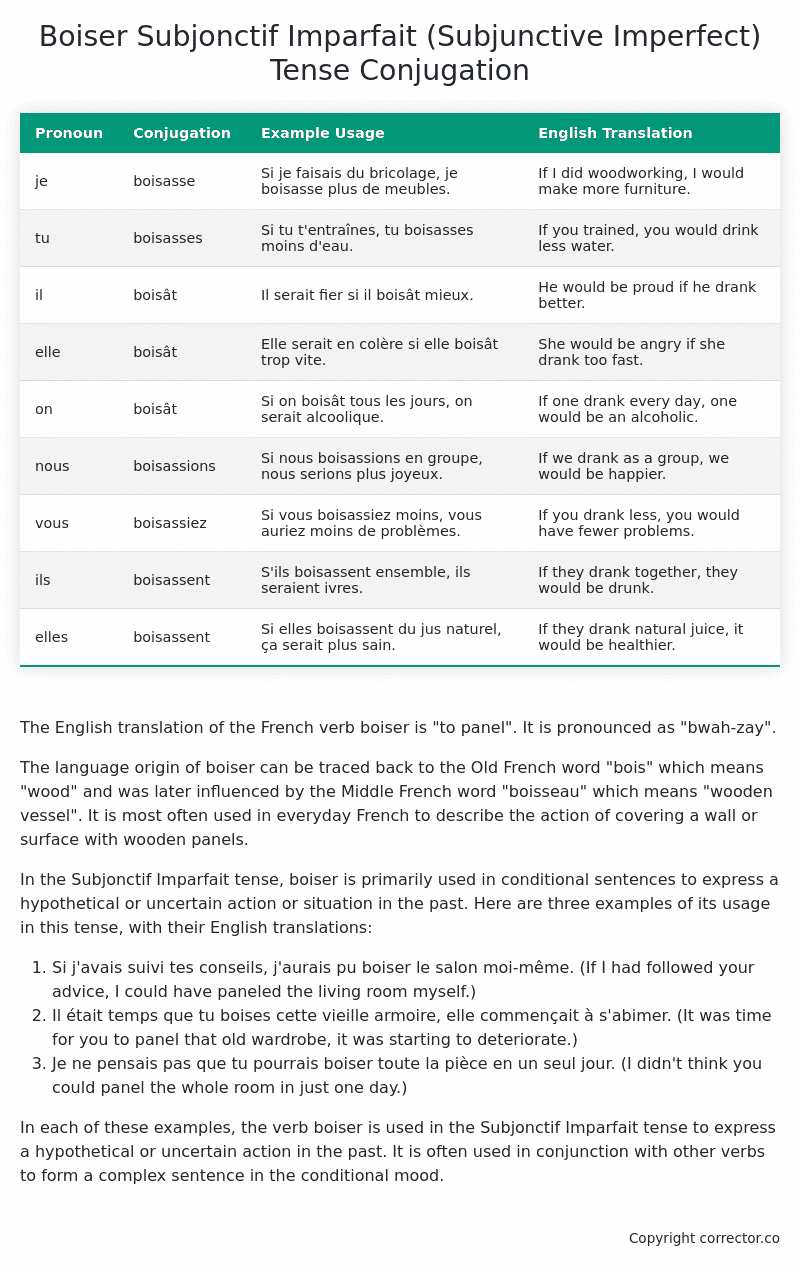Subjonctif Imparfait (Subjunctive Imperfect) Tense Conjugation of the French Verb boiser
Introduction to the verb boiser
The English translation of the French verb boiser is “to panel”. It is pronounced as “bwah-zay”.
The language origin of boiser can be traced back to the Old French word “bois” which means “wood” and was later influenced by the Middle French word “boisseau” which means “wooden vessel”. It is most often used in everyday French to describe the action of covering a wall or surface with wooden panels.
In the Subjonctif Imparfait tense, boiser is primarily used in conditional sentences to express a hypothetical or uncertain action or situation in the past. Here are three examples of its usage in this tense, with their English translations:
- Si j’avais suivi tes conseils, j’aurais pu boiser le salon moi-même. (If I had followed your advice, I could have paneled the living room myself.)
- Il était temps que tu boises cette vieille armoire, elle commençait à s’abimer. (It was time for you to panel that old wardrobe, it was starting to deteriorate.)
- Je ne pensais pas que tu pourrais boiser toute la pièce en un seul jour. (I didn’t think you could panel the whole room in just one day.)
In each of these examples, the verb boiser is used in the Subjonctif Imparfait tense to express a hypothetical or uncertain action in the past. It is often used in conjunction with other verbs to form a complex sentence in the conditional mood.
Table of the Subjonctif Imparfait (Subjunctive Imperfect) Tense Conjugation of boiser
| Pronoun | Conjugation | Example Usage | English Translation |
|---|---|---|---|
| je | boisasse | Si je faisais du bricolage, je boisasse plus de meubles. | If I did woodworking, I would make more furniture. |
| tu | boisasses | Si tu t’entraînes, tu boisasses moins d’eau. | If you trained, you would drink less water. |
| il | boisât | Il serait fier si il boisât mieux. | He would be proud if he drank better. |
| elle | boisât | Elle serait en colère si elle boisât trop vite. | She would be angry if she drank too fast. |
| on | boisât | Si on boisât tous les jours, on serait alcoolique. | If one drank every day, one would be an alcoholic. |
| nous | boisassions | Si nous boisassions en groupe, nous serions plus joyeux. | If we drank as a group, we would be happier. |
| vous | boisassiez | Si vous boisassiez moins, vous auriez moins de problèmes. | If you drank less, you would have fewer problems. |
| ils | boisassent | S’ils boisassent ensemble, ils seraient ivres. | If they drank together, they would be drunk. |
| elles | boisassent | Si elles boisassent du jus naturel, ça serait plus sain. | If they drank natural juice, it would be healthier. |
Other Conjugations for Boiser.
Le Present (Present Tense) Conjugation of the French Verb boiser
Imparfait (Imperfect) Tense Conjugation of the French Verb boiser
Passé Simple (Simple Past) Tense Conjugation of the French Verb boiser
Passé Composé (Present Perfect) Tense Conjugation of the French Verb boiser
Futur Simple (Simple Future) Tense Conjugation of the French Verb boiser
Futur Proche (Near Future) Tense Conjugation of the French Verb boiser
Plus-que-parfait (Pluperfect) Tense Conjugation of the French Verb boiser
Passé Antérieur (Past Anterior) Tense Conjugation of the French Verb boiser
Futur Antérieur (Future Anterior) Tense Conjugation of the French Verb boiser
Subjonctif Présent (Subjunctive Present) Tense Conjugation of the French Verb boiser
Subjonctif Passé (Subjunctive Past) Tense Conjugation of the French Verb boiser
Subjonctif Imparfait (Subjunctive Imperfect) Tense Conjugation of the French Verb boiser (this article)
Subjonctif Plus-que-parfait (Subjunctive Pluperfect) Tense Conjugation of the French Verb boiser
Conditionnel Présent (Conditional Present) Tense Conjugation of the French Verb boiser
Conditionnel Passé (Conditional Past) Tense Conjugation of the French Verb boiser
L’impératif Présent (Imperative Present) Tense Conjugation of the French Verb boiser
L’infinitif Présent (Infinitive Present) Tense Conjugation of the French Verb boiser
Struggling with French verbs or the language in general? Why not use our free French Grammar Checker – no registration required!
Get a FREE Download Study Sheet of this Conjugation 🔥
Simply right click the image below, click “save image” and get your free reference for the boiser Subjonctif Imparfait tense conjugation!

Boiser – About the French Subjonctif Imparfait (Subjunctive Imperfect) Tense
Formation
Common Everyday Usage Patterns
Interactions with Other Tenses
Subjonctif Présent
Indicatif Passé Composé
Conditional
Conditional Perfect
Summary
I hope you enjoyed this article on the verb boiser. Still in a learning mood? Check out another TOTALLY random French verb conjugation!


